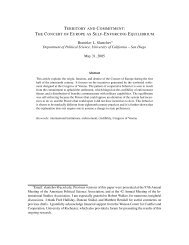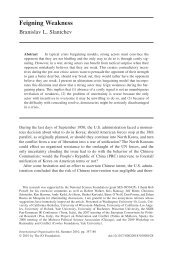Introduction to International Relations Lecture 10 - Branislav L ...
Introduction to International Relations Lecture 10 - Branislav L ...
Introduction to International Relations Lecture 10 - Branislav L ...
You also want an ePaper? Increase the reach of your titles
YUMPU automatically turns print PDFs into web optimized ePapers that Google loves.
it would be able <strong>to</strong> extract $5 billion in concessions from the British. For the<br />
Germans, the payoff of building a navy unopposed results in <strong>10</strong> + 5 − 3 = $12<br />
billion. That is, it yields a net improvement of $2 billion over the status quo<br />
without armaments. For the British, the result is <strong>10</strong> − 5 = $5, a $5 billion loss<br />
in concessions (and this is without going <strong>to</strong> war at all). These payoffs are listed<br />
in Figure 1, in the cell corresponding <strong>to</strong> the decisions “build” for Germany and<br />
“don’t build” for Britain.<br />
Finally, consider what would happen if Britain modernized its fleet of dreadnoughts<br />
without Germany improving its navy. This would cost the British the $3<br />
billion, but it would enable them <strong>to</strong> enjoy an even better position with respect<br />
<strong>to</strong> Germany, perhaps even threatening <strong>to</strong> blockade the North Sea if need be.<br />
Further, given its worse inferiority, Germany could not hope <strong>to</strong> be able <strong>to</strong> resist<br />
should the British demand some concessions of their own. Suppose the Germans<br />
thought that they would have <strong>to</strong> part with $5 billion worth of concessions<br />
if the now immensely powerful Bri<strong>to</strong>ns demanded it. The net result would be<br />
<strong>10</strong> − 3 + 5 = $12 billion for the British, and <strong>10</strong> − 5 = $5 billion for the Germans.<br />
These payoffs are listed in the cell corresponding <strong>to</strong> the “don’t build” decision<br />
for Germany, and the “build” decision for Britain.<br />
This completes our table. What would you do if you were Germany? You<br />
would ask yourself what your best course of action would be given what the<br />
British are likely <strong>to</strong> do. If Britain builds its navy, you would get $7 billion if you<br />
build as well, and you would be left with only $5 billion if you don’t. Hence,<br />
your best choice would be <strong>to</strong> build as well. If, on the other hand, Britain does<br />
not build its navy, then you would obtain $<strong>10</strong> billion if you do not build as well.<br />
However, you would get $12 billion if you do, and so your best choice would be<br />
<strong>to</strong> build the navy. In other words, Germany’s best choice is <strong>to</strong> build her navy no<br />
matter what British response might be.<br />
What about the British? We go through a similar exercise: what is the best<br />
response <strong>to</strong> German armament? Building yields $7 and not building only $5,<br />
and hence the optimal choice would be <strong>to</strong> expand the Royal Navy <strong>to</strong>o. What if<br />
the Germans don’t build anything? Then, building yields $12, and not building<br />
results in the status quo with $<strong>10</strong>. Hence, building is optimal as well. In<br />
other words, Britain’s best choice is <strong>to</strong> build her navy no matter what German<br />
response might be.<br />
We conclude that when each ac<strong>to</strong>r pursues his optimal strategy, the result<br />
is an arms race: both build their navies and end up paying the costs without<br />
reaping any of the benefits of having a superior fleet. Even though both would<br />
have preferred <strong>to</strong> live with the status quo without the built-up navies and enjoy<br />
$<strong>10</strong> billion each, they end up with a worse situation where they have spent<br />
$3 billion each with nothing <strong>to</strong> show for it. 2 The situation described here is<br />
2 And what happened in the naval arms race? The Germans could not keep up because there<br />
was strong domestic opposition <strong>to</strong> raising taxes further. Moreover, as tensions escalated in<br />
1913-14, pressure mounted <strong>to</strong> shift spending <strong>to</strong>ward the Army. Even though the naval arms<br />
race did not cause the First World War, it did contribute <strong>to</strong> poisoning the relations between<br />
the two Great Powers, perhaps creating a situation that was more flammable than it otherwise<br />
8








